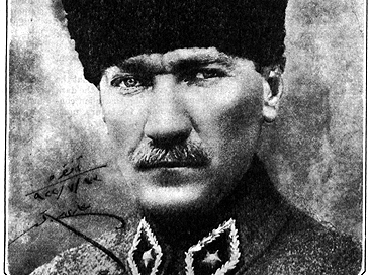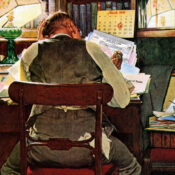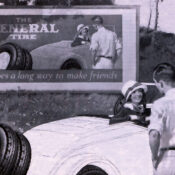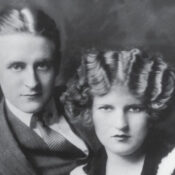Kemal judged from the firing, and from the direction of the advance, that this was no mere feint but a serious attack. He took it on himself at once to order all three battalions standing on parade to carry out their prearranged maneuver. They were followed by the whole of a second regiment and by a mountain battery which Mustapha himself posted and directed. He had committed the commander of the other division as well as his more cautious superiors, and had, in fact, saved the situation.
At the close of the World War, Turkey lay prostrate. The British Fleet was in the Bosporus, and the Sultan and his advisers were under the thumb of the Allies. When the Armistice of Mudros was signed in 1918 and the Turks surrendered, Kemal had just returned from Palestine, where, after a heroic struggle, he saved the Turkish rearguard. He was now made inspector-general of the remnants of the Turkish forces in Asia Minor with a view to bringing order out of the chaos into which the defeated Turkish Army had been plunged.
In May, 1919, the Greeks occupied Smyrna, which they had long coveted. This ill-advised procedure was due almost entirely to Lloyd George, and, although the British premier did not realize it at the time, was the first of the events that hurled him from power.
Just as it marked the beginning of ultimate disaster for the Greeks, and the final overthrow of Lloyd George, so did it at the same time mean that Kemal’s great hour had come. The occupation of Smyrna by the Greeks, together with the brutal way they imposed their will, was the spark, as it were, that started the flame of the new nationalism in Turkey.
Far up beyond Erzerum was Kemal with the remnants of an army which he had been sent to demobilize and disarm. As news of the Greek outrages in and around Smyrna, and accounts of the deportation of many of his Constantinople colleagues by the British filtered in, he realized that the time to strike was at hand. Instead of demobilization and disarmament he sent out a call for arms and volunteers with which to resist what he believed was the inevitable extinction of his country. He began to organize a counter government whose platform was the liberation of Turkey from foreign domination. Since he was the head and front of the movement his followers came to be called Kemalists. The first capital of this new nationalist movement was Erzerum, in what was Turkish Armenia. Later it was moved to Sivas, and early in 1920 to Angora.
Meanwhile the Sultan’s government at Constantinople, at Allied dictation, had sent peremptory word to Kemal to return. When he refused he was outlawed and sentenced to death. This only added to his growing popularity.
Kemal’s task was twofold: One phase was to “Drive out the Greeks,” as the slogan became; the other was to perfect the Nationalist Government. Both consummations were achieved. They required the genius and strategy of military leadership on the one hand, and keen, organizing statesmanship on the other. Kemal combined all these necessary qualities in himself.
There is no space here to recount the story of those two years of fighting in which the Greeks advanced as far as the Sakaria River, which means that they were forty miles from Angora, and how under Kemal and the no less astute Ismet Pasha, who is a soldier and not a diplomat by training, the invaders were driven back into the sea. It is an oft-told tale.
Turkey’s New Constitution
What concerns us mainly is the system of government that Kemal created amid the hardship and discomfort of Angora, and with every alien hand except ours raised against him. It is really a striking adventure in democracy. Although not so technically designated, it is for all practical and working purposes a republic.
Under the so-called National Pact adopted by the Grand National Assembly in Angora in 1920 the Turks paralleled the American Declaration of Independence. It declared, among other things, that “it is a fundamental condition of our life and continued existence that we, like every country, should enjoy complete independence and liberty in the matter of assuring the means of our development, in order that our national and economic development should be rendered possible.”
The -new Turkish Constitution is embodied in what is known as the Fundamental Law, which decrees that the sovereignty of the nation rests with the nation as elected by the people. This assembly alone can declare war or make peace. It elects its president—the office now held by Kemal Pasha—who is the first official of the state. As I have already pointed out, the assembly also chooses the members of the cabinet.
Far more significant than these innovations, when you consider the past history of Turkey, is the absolute separation of church and state. The sultan business is finished, and the head of the Moslem faith reposes in a caliph named by the Grand National Assembly. He continues as spiritual chief of the Mohammedan world but has no influence upon Turkish affairs. In brief, he is the pope of the Moslems.
This separation of church and state has a big meaning for the foreigner and his business interests. Until the Nationalist movement a sort of extraterritoriality under the name of capitulations existed. These were necessary under the old regime because religion and law were closely related. The church throve upon the ignorance and superstition of the masses. The Pious Foundation—the Evkaf, as it is called—which controls all church property, is one of the richest trusts in the world. Hence, as in China, the alien had to have his own courts. One of the first things that Kemal did was to abolish the capitulations. With the courts purged of religious influence the alien now has a square deal.
Personal Characteristics
By this time you will have realized that Kemal is no ordinary person. When you study the man and his method, you discover that two qualities underlie his astounding performance. One is doggedness of purpose which marches at the behest of an iron will; the other is his profound respect for public opinion. Although the adored of his people, who have implicit faith in his judgment, he has, from the start, consulted them in every step. When he wants to put over a proposition he goes to the masses and through the agency of what we should call a town meeting states his case. So in his relations with the Grand National Assembly.
Although he is a stickler for smart clothes and etiquette his whole life has been marked by a direct simplicity. When he went to the front to lead the last stand of the Turks against the advancing Greeks the only document that he left behind was the following brief note for Dr. Adnan Bey, who was then vice president’, of the Grand National Assembly: “To the Vice President of the Grand National Assembly: I am leaving for the front and I ask you kindly to take care of my affairs during my absence. MUSTAPHA KEMAL, President of the Grand National Assembly.
Compare the failure of Enver Pasha with the success of Kemal Pasha and you can see how they differed in strategy. Enver went straight ahead to the fulfillment of his purpose. If he struck a stone wall he tried to batter it down. Eventually he succumbed. Kemal, when he meets an obstacle, waits patiently until he can get around it, and he usually gains his ends.
The patience to which I have just alluded stood him in good stead at Sakaria, which represents the peak of his military career. For days the outlook was desperate. Regiment after regiment had been hurled against the Greeks, who fought them back with terrible loss. Three divisional generals were killed in the first day’s fighting. Turkish disaster seemed inevitable. An orderly dashed up to Kemal saying that another position had been lost. Turmoil raged all round him, but the commander in chief stood unmoved and without the slightest expression on that sphinx like face.
At the critical hour he gave a quiet word of command and five thousand picked troops, which he had kept in reserve and under cover, leaped into action. Their instructions were not to fire until they saw the whites of the enemy’s eyes. They turned the tide and the Greek retreat began.
For the moment Kemal is secure on the dizzy eminence where the tide of his accomplishments, aided by the almost frenzied acclaim of his people, has landed him. On August fourteenth last he was reelected president of the Grand National Assembly. Only one vote was cast against him. It was for Ismet Pasha, and the impression is that Kemal so honored his eminent associate. Thus for two years his post is safe.
Meanwhile his troubles will begin. Just now he dominates—in fact he is—the so-called Defense of Rights Party, which is the People’s Party, and which has practically no opposition. Another wing must eventually develop and the inevitable political division will arise.
More immediate is the task of translating that kindling formula of economic and political self-determination, the Magna Charta of the new Turkey, into cold and practical reality. The tumult and shouting have died out. Peace is signed. The wounds of conflict must now be bound up. Kemal’s real test as national leader, therefore, will be to bring order and prosperity out of the rack and ruin wrought by twelve years of almost continuous warfare.
Whether as economic messiah he will duplicate his astounding record in field and forum remains to be seen. Whatever fate holds out for him, he has already written himself large in the history of his time.
Become a Saturday Evening Post member and enjoy unlimited access. Subscribe now




Comments
Very clever and very peaceful . Great leader.
History without bias is probably best perceived through articles written at its time for events and personalities which (who) are to be evaluated after passing the test of time, but are tarnished by opponents contemporaneously on purpose because they still continue to effect the present by their lasting resonances. Having learnt him very well to easily admire such a high caliber leader encompassing all universal values at large,I believe Kemal Pasha (our Ataturk) will contine to shine ever more, to become eventually a star above most founding fathers for all humanity.
It was great to read from a amazing journalist who got face to face with the great leader I admire.
Thank you Saturday Evening Post for publishing this article, and giving us another opportunity to learn Ataturk from his own words.
ATATÜRK YÜZYILIN LİDERİDİR. ÖNGÜRELERİ BİR BİR ÇIKIYOR. AYRICA BU RÖPORTAJI GERÇEKLEDİĞİNİZ İÇİN GAZETENİZE ŞÜKRANLARIMI İLETİYORUM…
I really appreciate your help, also publishing online this article is great! Hope many people can reach it easily and read, and understand one more time we had best leader in Turkish history and we need to keep all that improvement in hour life and history.
Thank you one more time for publishing this great article, and many many great years to the Post…
The greatest leader on earth. Thanks for everything Ataturk.
I would like to convey my gratitude to The Post. I have to express my appreciation that among other qualifications, The Saturday Evening Post has the vast experience and capability to enlighten the history.After 89 years posting this interview on your website is great service to acquaint the people on history.
I wish many successful 300 years to Saturday Evenin Post.